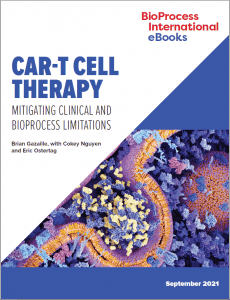eBook: CAR-T Cell Therapy — Mitigating Clinical and Bioprocess LimitationseBook: CAR-T Cell Therapy — Mitigating Clinical and Bioprocess Limitations
 Developers of chimeric antigen receptor (CAR) T-cell therapies are working in a state of tempered optimism. As of September 2021, the US Food and Drug Administration has approved only five such products, two coming this year. Now that those approved products have demonstrated the viability of CAR-based immunotherapies, drug developers are trying to address significant limitations that have come to light with increases in available clinical data and bioprocess knowledge. One shortcoming concerns therapeutic efficacy. Blood cancer patients who have been treated with CAR-T products often respond well initially but find their cancers relapsing over time, and these cell therapies have shown only modest success against solid tumors. A second limitation relates to autologous processing, which remains by far the most common approach to CAR-T production — and the only strategy used for the five currently approved products. Despite such concerns, cell therapy developers remain undeterred and many new candidate therapies in clinical trials feature compelling new CAR designs and CAR-T production processes. In this eBook, BPI’s associate editor shares interviews with two executives representing clinical-stage cell therapy companies. The conversations herein describe emerging strategies for increasing CAR-T effectiveness against solid tumors, transitioning from autologous to allogeneic processing, and perhaps accomplishing both goals simultaneously. Download the eBook now to learn strategies for sourcing sufficiently healthy T cells, improving therapy efficacy and longevity, and anticipating large-scale manufacturing requirements.
Developers of chimeric antigen receptor (CAR) T-cell therapies are working in a state of tempered optimism. As of September 2021, the US Food and Drug Administration has approved only five such products, two coming this year. Now that those approved products have demonstrated the viability of CAR-based immunotherapies, drug developers are trying to address significant limitations that have come to light with increases in available clinical data and bioprocess knowledge. One shortcoming concerns therapeutic efficacy. Blood cancer patients who have been treated with CAR-T products often respond well initially but find their cancers relapsing over time, and these cell therapies have shown only modest success against solid tumors. A second limitation relates to autologous processing, which remains by far the most common approach to CAR-T production — and the only strategy used for the five currently approved products. Despite such concerns, cell therapy developers remain undeterred and many new candidate therapies in clinical trials feature compelling new CAR designs and CAR-T production processes. In this eBook, BPI’s associate editor shares interviews with two executives representing clinical-stage cell therapy companies. The conversations herein describe emerging strategies for increasing CAR-T effectiveness against solid tumors, transitioning from autologous to allogeneic processing, and perhaps accomplishing both goals simultaneously. Download the eBook now to learn strategies for sourcing sufficiently healthy T cells, improving therapy efficacy and longevity, and anticipating large-scale manufacturing requirements.
Fill out the form below to read the eBook now.
You May Also Like






